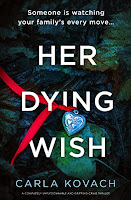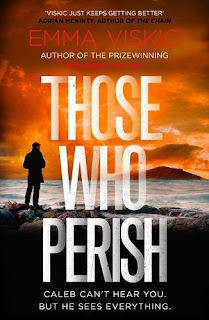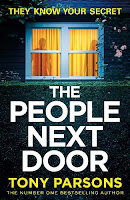The Girl in the Ground is by Stacy Green. She was beautiful: shiny blond hair, crystal blue eyes and the widest smile Nikki had ever seen. She thought back to what she had seen in the ground, the dirt that caked the white bones. All that remained of her now was the silver locket that was still around her neck… When construction workers unearth a girl’s skeleton in Stillwater, Minnesota, Special Agent Nikki Hunt is called to the scene by her boyfriend Rory. Nikki knows instantly that the girl was murdered, but she is shocked when Rory immediately recognizes her. The victim was his childhood sweetheart, Becky, and he was the last person to see her before she went missing twenty-four years ago. With the love of her life now a potential suspect, Nikki is forced to take a step back from the case. But then her colleague Liam finds lies in Rory’s statement – it appears that Becky may have been carrying Rory’s child when she was killed. Despite this, Nikki still thinks he could be innocent, and knows she must find the real killer herself if Rory stands any chance of walking free. When Nikki finds a potential link to two pregnant girls who were found murdered years before it’s clear that this is the most twisted killer that she has ever faced. And then another girl goes missing from Stillwater. Can Nikki unearth the truth and protect the man she loves? And will she find the missing girl in time to save her life?
Looking down at the familiar, pale and lifeless face floating in the salty waters of the marsh, her blood freezes. It’s a face she hasn’t seen for years, but used to know so well… When Detective Casey White is called to a murder scene in the Outer Banks saltmarshes, she’s devastated to find the strangled body of her ex-husband—father of her missing daughter Hannah. And nearby, an older, unidentifiable body is buried too… but how are these bones linked to her ex? Painful memories flood back as Casey desperately searches his apartment, surrounded by photos of them happy with their little girl. Finding a notepad with the name of the hospital where Hannah was last seen scrawled on it, Casey realizes her ex recently discovered something about their child’s disappearance. But who was trying to silence him? Then forensics show the bones belong to a sweet young nurse who worked at the same hospital. Delving into hospital records, Casey is shocked to learn she once held Hannah as a little baby… Her boss insists she can’t work such a personal investigation, but Casey is in too deep. Interviewing all the staff at the hospital, she’s sure one of the doctors is acting suspiciously… and that night, Casey wakes up barely able to breathe as flames devour her home. Now she’s in the killer’s sights. To finally catch this twisted monster and learn what happened to her stolen girl, Casey will have to risk everything… The Memory Bones is by B R Spangler.
I'll Never Tell is by Casey Kelleher. When we were young, Sarah and I did a terrible thing – but it was only me who paid the price. Now, just when I thought no one from my old life would ever find me, a note is slid under my door: I haven’t forgotten. I haven’t forgiven. FOUND YOU. My best friend Sarah and I used to spend all our time in a place we called the Doll House. It was just an old, abandoned cottage in the woods behind our house but it was heaven to us. Until one of our games went wrong. And someone ended up dead. It was an accident, or at least Sarah told me it was. But when I tried to tell the police that I wasn’t involved, they didn’t believe me. When the Doll House Girls were splashed across the newspapers, it was my face they showed under the headlines. I’m the one who stood trial. Now, twenty years on, I’ve made a new life with a new identity. I have a wonderful husband, Carl,and Jacob, our adorable son. Despite everything in my past, I’m happy. Then the first note arrives. FOUND YOU. Soon other threats start coming, and the person behind them is clear they’d be willing to hurt my family – to hurt Jacob – to get to me. I know who they are. And I know what they’re capable of. The other doll… The girl who got away with murder.
Stillwater Island is by Gregg Olsen. “Mommy, I’m scared.” Marlena’s precious boy lies with his little arm thrown over her thigh. It’s pitch-black, and she can hear seagulls. She realises they must be near water, and a new panic rises in her. At 2 a.m. one icy winter morning, in the smart suburbs of Jefferson County, local father Ben Parker reports his wife Marlena and their little boy missing. Rushing to the impressive family home, Detective Megan Carpenter finds the halls adorned with pictures of the beautiful, stay-at-home mom and their bright-eyed son. But that’s not all she finds… A bottle of prenatal vitamins in the bathroom cabinet reveal that Marlena is pregnant. Why didn’t Ben mention this in his panicked call to the police? Digging deeper into their seemingly perfect marriage, Megan’s fear begins to grow. The couple are separated, there’s talk of an affair, and the neighbours report loud fights. And then, Megan tracks a young woman believed to be Ben’s secret girlfriend, only to find her lifeless body in a secluded wood. Ben’s watch lies in the undergrowth, and Megan’s team think she’s cracked the case, but she’s sure something’s not right. Ben’s family has wealth including a private island, and connections in high places. Is someone trying to block their investigation? As Megan starts to wonder if the answer lies on the Parkers’ closely guarded island, just offshore, a shocking revelation makes her question everything. With a killer on the loose, can Megan find the missing pieces to the most complex case of her career and bring Marlena and her little boy home alive? Or will it be too late to save them?
When the star guest collapses at a wine tasting, it seems someone has a taste for murder. Fortunately, amateur sleuth Belinda Penshurst was at the event – and now she’s on the case! Belinda Penshurst loves her home village Little Challham, and its charming, peaceful ways. So when wine critic Sadie Oppenshaw dies at a tasting Belinda organised, she immediately turns detective to uncover the poisoner… Accompanied by retired detective Harry Powell and her boisterous Labrador Horatio, Belinda sets out to investigate the world of wine. There are scandals brewing everywhere… but do the local DIY enthusiasts have a deadly vendetta, or did Sadie’s reviews cause a resentful restaurant owner to crack? When another of the guests at the wine tasting is found poisoned, it becomes clear the killer is only just getting started. Can Belinda crack the case and open the champagne, before the murderer catches up with her? Murder at the Castle is by Lisa Cutts.
The Drowning Girls is by Lisa Regan. In the thin glow of moonlight, a mess of auburn curls gleams against the rocks. Hands bound, the girl’s fragile body is limp and still. Seconds later, a wall of raging white water crashes down, swallowing her whole… A knock on the door late in the evening can only mean trouble for Detective Josie Quinn, but fear chokes her at the news that the one of her own team is missing. No one has seen Denton PD’s beautiful Press Liaison Amber for days. Sweet-natured and totally dedicated to the job, she’d never let her colleagues down. A message scrawled on the frosted windscreen of Amber’s car leads Josie to a nearby dam. But the body they pull from the water is not Amber… Josie won’t sleep until she finds a name for the innocent girl left to drown, and the meaning of the numbers scribbled in a tattered pink diary found on Amber’s desk. But when the trail leads her to a twisted truth about Amber’s family, Josie wonders if anyone really knew her at all? Her team crumbling around her, Josie must stay strong and focused to get the job done. But as prime suspects start going missing, and rumors of an argument the night Amber disappeared surface, could one of her own staff be to blame? Finding Amber alive is Josie’s only chance of knowing the truth and stopping a dangerous killer in their tracks. But as a blizzard closes in, how many more precious lives will be snatched before she can?
Kerstin is wide awake. While her family sleeps around her, the devastating secret her husband just told her is spinning through her mind. Does she really know the man she married? And are her children still safe in this small town? She jumps as she hears a sound from outside. Peering into the inky darkness, her eyes focus on movement at the bottom of the garden. Someone is out there. She watches as the figure strikes a single match. Kerstin gasps at the sight of the face staring back at her, smiling, as if enjoying her fear. A car door slams and the figure makes a dash for the trees, leaving something behind – a small memorial candle. As it flickers in the darkness, Kerstin knows exactly what it means. Someone is coming for her, and her family is in terrible danger… Her Dying Wish is by Carla Kovach.









































